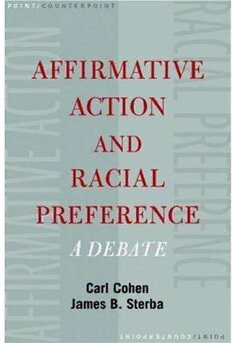
Affirmative Action and Racial Preference: A Debate (Point Counterpoint) PDF
412 Pages·2003·2.278 MB·English
Most books are stored in the elastic cloud where traffic is expensive. For this reason, we have a limit on daily download.
Preview Affirmative Action and Racial Preference: A Debate (Point Counterpoint)
Description:
Racial preferences are among the most contentious issues in our society, touching on fundamental questions of fairness and the proper role of racial categories in government action. Now two contemporary philosophers, in a lively debate, lay out the arguments on each side. Carl Cohen, a key figure in the University of Michigan Supreme Court cases, argues that racial preferences are morally wrong--forbidden by the 14th Amendment to the Constitution, and explicitly banned by the Civil Rights Act of 1964. He also contends that such preferences harm society in general, damage the universities that use them, and undermine the minorities they were intended to serve. James P. Sterba counters that, far from being banned by the Constitution and the civil rights acts, affirmative action is actually mandated by law in the pursuit of a society that is racially and sexually just. The same Congress that adopted the 14th Amendment, he notes, passed race-specific laws that extended aid to blacks. Indeed, there are various kinds of affirmative action--compensation for past discrimination, remedial measures aimed at current discrimination, the guarantee of diversity--and Sterba reviews the Supreme Court cases that build a constitutional foundation for each. Affirmative action, he argues, favors qualified minority candidates, not unqualified ones. Both authors offer concluding comment on the University of Michigan cases decided in 2003. Half a century after Brown v. Board of Education, issues pertaining to racial discrimination continue to grip American society. This penetrating debate explores the philosophical and legal arguments on all sides of affirmative action, but also reveals the passions that drive the issue to the forefront of public life.
See more
The list of books you might like
Most books are stored in the elastic cloud where traffic is expensive. For this reason, we have a limit on daily download.
